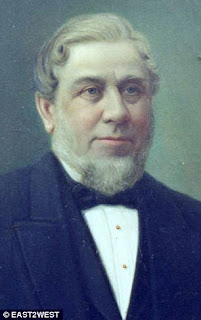 |
|
COL Strelkov and Denis Pushilin, who calls
himself the chairman of “People’s Republic of Donbass discuss their OSCE
hostages with the press
|
'Save us Nigel Farage!' Leader of east Ukraine's pro-Moscow separatist movement issues bizarre plea for help to Ukip leader
- Denis Pushilin tells Farage of his region's shared heritage with Britain
- Industrial city of Donetsk was founded by Welsh engineer in 1870
- 'We ask for your support for a referendum on independence,' he writes
The
leader of pro-Russian separatists in eastern Ukraine has issued a bizarre
appeal for British help via UKIP leader Nigel Farage.
Denis
Pushilin, head of the self-declared 'Donetsk people's republic', sent his plea
as Ukrainian forces arrived to crush an uprising against the country's new, pro-EU
government.
In
an email he told Mr Farage that Donetsk was founded by a British engineer and
businessman John Hughes in 1870, after he was granted a concession by the
Russian government under tsar Alexander II.
'We are appealing not just to fellow Russians, but to the people of
Britain,' said Mr
Pushilin.
'We believe that Britons, like Russians, are not "of
Europe" - as Winston Churchill put it - and will not be "with"
Ukrainian ultra-nationalists, the EU, US and NATO in repressing our identity,
our right to speak Russian and our desire to be with Russia as well as to
celebrate our historical Russo-British heritage.
'On behalf of the overwhelming majority of the people of Donetsk, we
are asking for your support for a referendum on the independence of Donetsk
Region.
'We believe that UKIP represents the spirit of the British people
more than any other party, and are issuing a "Mayday" distress
signal.
'The danger of our potential extermination by the Kiev
"authorities" is hanging over us and anybody, who holds the same
views, like a sword of Damocles.'
The
breakaway leader - who has strong support in Russia - declared: 'We are hoping that you and the people of Britain will
respond to our appeal and help Donetsk to defend the right to keep its own
identity and our lives, which are endangered by the new "government"
in Kiev.
'Please stand up for us, like the statue of John Hughes in the
centre of our city, a testament to our special relationship, which doesn't have
to be a thing of the past. Let us all have a future.'
Mr
Pushilin confirmed that his appeal was genuine. MailOnline contacted UKIP for
comment, but no one was available.
Last
month Mr Farage was accused of being an apologist for Putin after he claimed
the EU had 'blood on its hands' over Ukraine.
Mr Pushilin's 'Donetsk People's Republic' is seen by Kiev and the West as a tool by separatists to help the Russian secret services split east Ukraine from the rest of the country, and put it fully under Moscow's sway.
He
and his supporters have occupied the main regional government building for ten
days, and declared the Donetsk People's Republic with a central demand of a
referendum on their future status.
They
are protected by barricades and armed gunmen wearing balaclavas.
His
supporters are split between those wanting autonomy within Ukraine and others
seeking immediate incorporation by Russia.
'One thing is clear, there will be no May 25 presidential elections
for us,' said Mr
Pushilin, referring to Kiev's plans for a national poll to elect a new
government.
 |
|
Founder: John
Hughes was a Welsh engineer who came to the region in 1870 and for many years
Donetsk was named after him - as Hughesovka
|
Hughes
was a Welsh engineer and for many years Donetsk was named after him - as
Hughesovka.
Later
in 1924 it was renamed Stalino after Soviet leader Josef Stalin.
Welshman
Hughes was born in Merthyr Tydfil and as an an engineer won acclaim for his
armaments designs.
After
switching to the Millwall Iron Works in London, where he designed a gun
carriage for heavy cannons, used by the Royal Navy, he received an order from
the Russian Imperial government.
He
was granted land in what is now Donetsk, taking with him around 100 ironworkers
and miners from South Wales.
He
personally established hospitals, schools, bath houses, tea rooms, a fire
brigade and an Anglican church in his new town, now a city of almost one million.




No comments:
Post a Comment